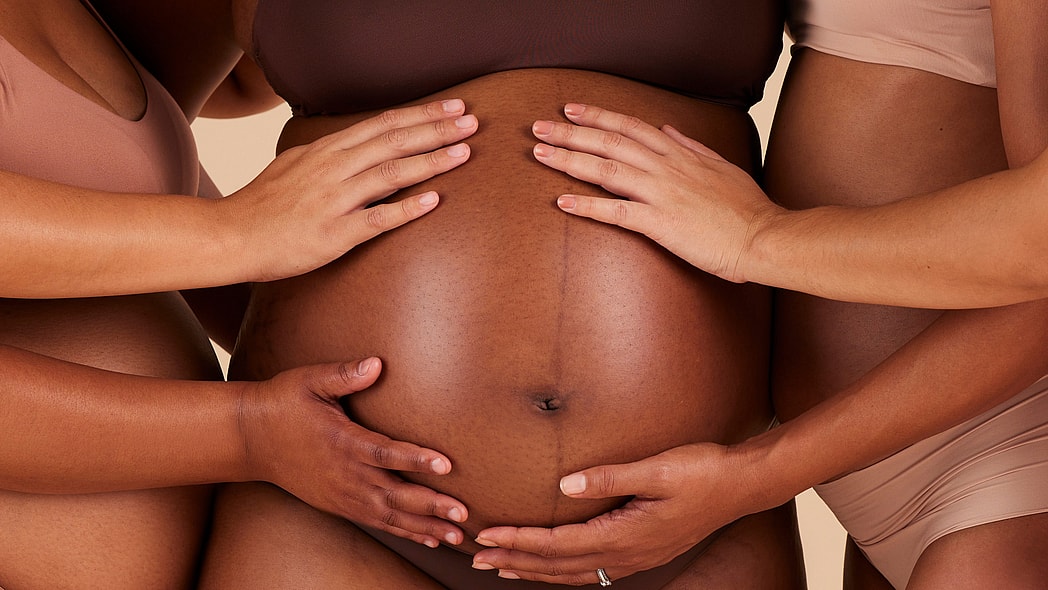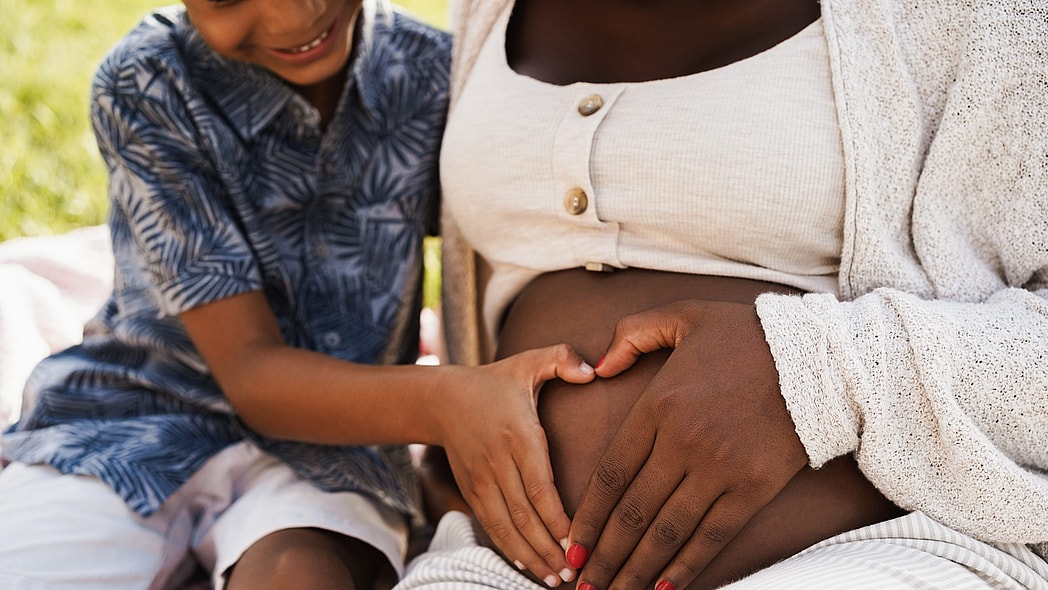This past April, you may have seen an influx of articles and social media posts acknowledging Black maternal health and mortality, a national issue that took precedence from April 11 through April 17, recognized as Black Maternal Health Week (BMHW). Marking the second year since the Biden administration brought BMHW to national recognition with a White House Proclamation in 2023, the week is dedicated to bringing attention to the health and birth disparities affecting Black birthing parents. As stated by President Biden as an urgent call to action “Black Maternal Health Week is a reminder that so many families experience pain, neglect, and loss during what should be one of the most joyous times of their lives.”
Every birth deserves to be joyful — but amid bleak forecasts, how can Black families center joy, and where can they find and create support?
In June 2018, Black Mamas Matter Alliance (BMMA) co-directors Angela Doyinsola and Elizabeth Dawes Gay initiated BMHW, partnering with over 18 Black women-led organizations to launch the first-ever Black Maternal Health Week national campaign. Together, the organizations provide awareness to ensure expectant and aspiring Black and BIPOC parents know their rights.
Additionally, organizations like the newly launched birthFUND, BIPOC maternal wellness advocates, childbirth educators, Black doulas, and midwives have become additional resources as communities work to improve the odds for Black birthing parents, helping to change the trajectory and outcomes at every stage of their pregnancy.
Toshira Maldonaldo, a Black maternal health advocate and “birth activist” and co-founder of Beautiful W.O.M.B. (Women Overcoming Major Barriers) is one of many birth educators working towards dismantling systems that have neglected Black people and women for centuries. With over 25 years of experience as a community birth worker, she is now a community doula invested in the care and support of BIPOC families and maternal health, with joyful birth as a central goal.
“As a Black woman, a joyful birth looks like planning your birth, not letting your birth plan you. It looks like a birthing person deciding to bring a child into this world, ” Maldonaldo told theGrio.
At Beautiful W.O.M.B, parents are being educated on their medical rights, self-advocacy, medical terminology, and one-on-one sessions with doulas of their choice. The goal is to help parents understand the power of their voices and encourage them to use their voices when they feel like they aren’t being listened to by a provider. Maldonaldo describes advocacy as being straightforward: “A simple ‘I’m not happy with the care that I’m receiving and I would like to explore other options’[is adequate]; you have the right to ask for a director, director of nursing, or a hospitalist,” she advised.
Maldonado further explained that parents can monitor and take control of their experiences with medical institutions through simple steps. “Visits can look like asking for alternatives when tests make you nauseous, requesting printed results, copies of your blood work, chart information,” she said. “That’s the conversation; that’s advocacy where Mom is taking the initiative to ask the question and not settling when the doctor says, ‘Oh, well, it could be better, but don’t worry about it.’”
Continuing the legacy of spiritual healers and birth workers, Maldonado aims to educate Black and brown women by creating sustainable, supportive relationships while working alongside families to address communal disparities. As she told theGrio, it’s essential parents not only have all the information they need but understand that doulas serve to ensure a birthing person can exact power over their own body and care.
“Black joy is found in creating spaces for parents to be in touch and in tune with their inner child[ren], who may have been traumatized by some of the present systems we see today,” said Maldonaldo.
TheGrio also spoke with therapist and counselor Dr. Kristy Christopher-Holloway, who posited that “Black Joy is generational healing.” Dr. Holloway owns a private practice in Douglasville, Georgia, where she holds multiple roles — as a speaker, counselor, educator, and supervisor. Her work focuses on racially and ethnically marginalized women experiencing birth trauma, infertility trauma, reproductive loss, and other issues related to perinatal mental health.
“My work is educating my clients, helping support them through previous traumatic birth experiences, or if it is their first birth experience. What does that mean and look like for them?” Dr. Holloway explained
Like many who are unaware of alternative medical support during the perinatal process, there is also a dearth of information on available postnatal resources. Given that postpartum depression (PPD) is a hormonally induced condition that affects one in eight women after giving birth, PPD is a crucial component in the maternal health conversation. However, as previously reported by theGrio, a recent study found mental health is often overlooked in discussions about the mortality rates of Black mothers.
“The contribution of mental health conditions to the maternal morbidity and mortality crisis that we have in America is not widely recognized,” said Dr. Katherine Wisner, co-author of the study published by JAMA Psychiatry and associate chief of perinatal mental health at Children’s National Hospital, in a statement to CNN. “We need to bring this to the attention of the public and policymakers to demand action to address the mental health crisis that is contributing to the demise of mothers in America,” she added.
Recommended Stories
Further exacerbating the issue, in 2023, the American Journal of Obstetrics & Gynecology found a 140% increase in Black birthing parents diagnosed with PPD, drastically increasing from 9.2% to 22% since 2010. Beyond providing comprehensive pre and perinatal care, the long-term impact of educating each medical intern, licensed clinician, or supervisor in considering identity, intersections, and the holistic health of those they treat is tantamount to another parent saved.
Dr. Holloway has been working to improve these statistics, educating and training others through Postpartum Support International and treating individual clients. She notes that the treatments can be varied as the traumas, which can include prior birth experiences or complications, concern about the birthing process, difficulties with planned home births or water births which lead to anxiety-filled hospital births, or any desire or expectation that didn’t come to fruition.
Under the care of Dr, Holloway, clients are granted the space to work through and navigate their concerns — even if they may not be connected to birth. Through holistic care led with cultural competency and spirituality in mind, she helps patients process any treatment issues or concerns. This approach prioritizes the history and connections of clients while helping them identify culturally responsive care, providers, and environments sensitive to their belief systems, practices, and preferences, during and after the birthing process.
“This may be their only time, or the first time, where they’ve been able to be vulnerable or cry about something that happened,” Dr. Holloway noted. “How it may be connected — or how it connects [and] impacts their pregnancy. I’m helping them process while giving them information about some things to look out for.”
For Dr. Holloway and her clients, a joyful birthing experience is created in phases that start with defining joy; questions like: “What does a joyful birthing experience mean? Does that mean you want it to be quiet and calm? A natural birth or a water birth?
“So I think a joyful birth experience really honors, prioritizes and celebrates culturally responsive care for parents to feel empowered, supported, and respected,” Dr. Holloway continued. ”Being authentic in showing up as yourself without concern of being perceived.”
Said Maldonado, “We are curating a space for positivity by joyfully integrating and connecting our community …We have what it takes within our community to promote community education and impart models of sufficiency and sustainability.”
TreOnna Jones, a client of Maldonaldo’s expecting her first child in June, credits the support she received with helping her anticipate motherhood after initially wanting to end her pregnancy due to fear of being an unprepared young mother. “Being young, I was a bit nervous because friends of mine were forced to be induced in hospitals; but with my doula, I feel more comfortable and safe with delivering in a hospital,” Jones said.
“Being able to make the decision that I want to bring a child into this world means that I’m going to pay attention to my conditions, environment, health, finances, relationships, and everything that this child’s life will be immersed in,” she added. “It’s up to me right now to fix the condition so that my pregnancy then can not only be planned, but it can be joyful.”

Ifetayo Dudley, a multimedia journalist, currently serves as a Social Media & Marketing Associate at The Nike Track & Field Center at The Armory. Her media journey is a continuous exploration of storytelling’s multifaceted nature, spanning photography, videography, and graphic design.










